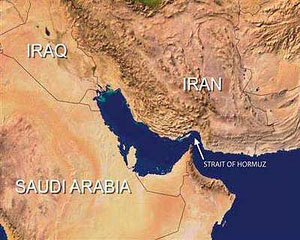Categories
 Iran may be playing military games as speculation rises that its military will soon be shutting down the Strait of Hormuz, a shipping channel where one-sixth of the world’s oil supply passes through.
Iran may be playing military games as speculation rises that its military will soon be shutting down the Strait of Hormuz, a shipping channel where one-sixth of the world’s oil supply passes through.
Oil prices rose the most in almost four weeks on speculation supplies will be disrupted after a report that Iran may be planning to close the Strait of Hormuz. Crude advanced as much as 3.6 percent after the state-run Fars news agency reported the military drills at the strait, however Iran’s Foreign Ministry denied the report.
Oil traders remain fearful that Iran could try and block the strategically-sensitive Strait of Hormuz that links the Gulf with the Gulf of Oman and through which much of the region’s oil is transported. Most of the crude exported from Saudi Arabia, Iran, the United Arab Emirates, Kuwait and Iraq – together with nearly all the liquefied natural gas from lead exporter Qatar – must slip through a 4-mile wide shipping channel between Oman and Iran.
About 15.5 million barrels of oil a day, or a sixth of global consumption, flows through the Strait of Hormuz between Iran and Oman, according to the U.S. Department of Energy. About a third of all sea-borne shipped oil passed through the Strait in 2009, according to the U.S. Energy Information Administration (EIA), and U.S. warships patrol the area to ensure safe passage.
Crude for January delivery gained $2.27, or 2.3 percent, to $100.04 a barrel at 12:59 p.m. on the New York Mercantile Exchange yesterday, the biggest increase since Nov. 16. Oil prices have risen 9.5 percent in 2011.
Iran pumped 4.25 million barrels a day of oil in 2010, 5.2 percent of the world’s total production, according to BP Plc’s Statistical Review of World Energy. It’s OPEC’s second-largest producer, after Saudi Arabia, according to Bloomberg News.
“We’re seeing a return of geopolitics to the market,” John Kilduff, a partner at Again Capital LLC, a New York- based hedge fund that focuses on energy. “The military exercise in the Strait of Hormuz signals an escalation in tension and has serious implications for the flow of oil.”
European governments are weighing a boycott of Iranian oil after a Nov. 8 report from the United Nations’ International Atomic Energy Agency that said the country was working on a nuclear weapons program as recently as last year and plans to continue the program. Iran strongly denies this and says it is developing nuclear energy for peaceful purposes.
A US drone captured by Iran is now the property of the Islamic republic, Iran’s Defence Minister Ahmad Vahidi said today, dismissing a request by US President Barack Obama for its return to stoke tensions between the two.
“This is the kind of story that sends a shock wave through the market,” said Rich Ilczyszyn, chief market strategist and founder of IiTrader.com in Chicago.
Oil also rose on speculation that the Fed will announce a third round of bond purchases in a tactic that has been dubbed quantitative easing. The Fed bought a total of $2.3 trillion in bonds in two rounds of quantitative easing from December 2008 until June 2011.






